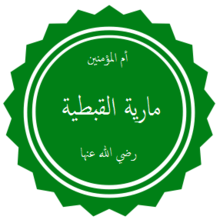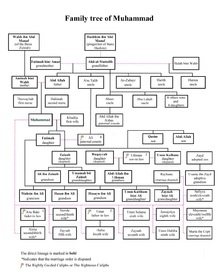Maria al-Qibtiyya
Maria bint Shamʿūn, better known as Maria al-Qibtiyya (Arabic: مارية القبطية), Maria Qubtiyya, or Maria the Copt (died 637), was an Egyptian who, along with her sister Sirin, were sent to the Islamic prophet Muhammad in 628 as a gift by Muqawqis, a Christian governor of Alexandria, Egypt during the territory's Persian occupation. She and her sister were slaves.[1][2] She spent the rest of her life in Medina where she embraced Islam and lived with the Prophet Muhammad when she bore a son, Ibrahim. The son would die as an infant and then she died almost five years later.[3]
Maria al-Qibtiyya | |
|---|---|
 | |
| Born | |
| Died | 637 |
| Title | Maria the Copt |
| Spouse(s) | Muhammad |
| Children | Ibrahim ibn Muhammad |

Biography
In the Islamic year 6 AH (627 – 628 CE), Muhammad is said to have had letters written to the great rulers of the Middle East, proclaiming the continuation of the monotheistic faith with its final messages and inviting the rulers to join. The purported texts of some of the letters are found in Muhammad ibn Jarir al-Tabari's History of the Prophets and Kings. Tabari writes that a deputation was sent to an Egyptian governor named as al-Muqawqis.
Tabari recounts the story of Maria's arrival from Egypt:
In this year Hātib b. Abi Balta'ah came back from al-Muqawqis bringing Māriyah and her sister Sīrīn, his female mule Duldul, his donkey Ya'fūr, and sets of garments. With the two women al-Muqawqis had sent a eunuch, and the latter stayed with them. Hātib had invited them to become Muslims before he arrived with them, and Māriyah and her sister did so. The Messenger of God, peace and blessings of Allah be upon Him, lodged them with Umm Sulaym bt. Milhān. Māriyah was beautiful. The prophet sent her sister Sīrīn to Hassān b. Thābit and she bore him 'Abd al-Rahmān b. Hassān.
— Tabari, History of the Prophets and Kings.[4]
The death of Ibrahim caused Muhammad to weep.[5]
Status as a Concubine or Wife
Like Rayhana bint Zayd, there is some debate between historians and scholars as to whether she officially became Muhammad's wife, or was just a concubine.[6][7][8] Though generally well-known in the Islamic tradition as a concubine of the Prophet, she has recently been raised to the status of a wife of the Prophet by certain modern-day scholars.[9] A fact proving she was a concubine however, is that when she bore her son to the Prophet, she was sent free.[10] Had she been a wife, it would have been out of place. There is also strong evidence that there was no living quarter for her in the proximity of the Prophet's Mosque.[11] Only the wives of the Prophet had their quarters adjacent to one another in the proximity of his mosque at Medina. On the opposed, Maria was made to reside permanently in an orchard, some three kilometers from the mosque.[12]The most direct evidence suggests she was a concubine as a narrated report shows by ‘Umar [b. al-Khattab]:
The Prophet said to Hafsa: ‘Do not to mention it to anyone, the mother of Ibrahim (i.e. Maria) is forbidden unto me.’ She said, ‘Do you forbid yourself what Allah has made lawful to you?’ He replied, ‘By Allah I will not be intimate with her.’ ‘Umar said, ‘He did not have intimacy with Maria whereas Hafsa mentioned it to ‘Aisha upon which Allah revealed, ‘Allah has already sanctioned (a way) for you (believers) to absolve yourselves from your oaths’’(Qur’an 66:2)[13]
However the majority of muslim scholars regard a different Asbāb al-nuzūl (circumstance of revelation) for the above mentioned Surah 66:1-5, namely the "honey-incident", which is narrated in the canonical Hadith Sahih al-Bukhari by Muhammed's wife Aisha:[14][15][16]
The Prophet (ﷺ) used to stay (for a period) in the house of Zaynab bint Jahsh (one of the wives of the Prophet ) and he used to drink honey in her house. Hafsa bint Umar and I decided that when the Prophet (ﷺ) entered upon either of us, she would say, "I smell in you the bad smell of Maghafir (a bad smelling raisin). Have you eaten Maghafir?" When he entered upon one of us, she said that to him. He replied (to her), "No, but I have drunk honey in the house of Zaynab bint Jahsh, and I will never drink it again." Then the following verse was revealed: 'O Prophet ! Why do you ban (for you) that which Allah has made lawful for you?. ..(up to) If you two (wives of the Prophet (ﷺ) turn in repentance to Allah.' (66.1-4) The two were `Aisha and Hafsa And also the Statement of Allah: 'And (Remember) when the Prophet (ﷺ) disclosed a matter in confidence to one of his wives!' (66.3) i.e., his saying, "But I have drunk honey."
In another report from Ibn ‘Abbas and ‘Urwah b. al-Zubair in the same context, the Messenger of Allah said to Hafsa:
'I make you witness that I my concubine (surriyyati) is now forbidden unto me.[17]
On the other hand several early biographers and classical hadith-scholars such as Al-Tabari, Al-Hakim Nishapuri & Abd Allah ibn Abbas do narrate that Mohammad married Maria al-Qibtiya. Among those is Ibn Abbas, the cousin of Mohammad, who, according to Khaled Abou El Fadl, narrates the following:[18][19]
[Mariya d. 637]: Ibn Abbas reported that the Prophet freed her and then married her. Maria bore the Prophet his son Ibrahim.'
Similar to Ibn Abbas, al-Tabari in his historical annals 'Tarih Tabari' & Ibn Kathīr in his biography about the wives of Mohammad, state that Maria was Mohammads wife:[20][21]
Mariyah the Copt was presented to the Messenger of God, given to him by al-Muqawqis, the ruler of Alexandria, and she gave birth to the Messenger of God’s son Ibrahim. These were the Messenger of God's wifes.'
Maria al-Qibtiyya is said to have married the Prophet and certainly everyone gave her the same title of respect as the Prophet’s wives, ‘Umm al Muminin’ ‘Mother of the Believers".
Additionally, the hadith-literature contains several narrations that identifies Maria as the wife of Mohammad. Among those is the canonic and authentic hadith by al-Muslim & Al-Mustadrak:[22][23]
Thereafter the Messenger of Allah married Maria bt. Shamun. She had been gifted to the Messenger of Allah by Maquqas, the chief of Alexandria.
See also
- Aisha bint Abu Bakr
- List of non-Arab Sahaba
Notes
- al-Tabari, Abu Jafar. The History of al-Tabari, Volume 9: The Last Years of the Prophet. Translated by Ismail K. Poonawala. SUNY Press. p. 141.
- Ibn Ishaq, The Life of Muhammad, p. 499.
- Ibn Ishaq, The Life of Muhammad, p. 653.
- Tabari, p. 131.
- "Sahih Bukhari". Sunnah.com. Retrieved 14 September 2018.
- Bennett, Clinton, ed. (1998). In Search of Muhammad. A&C Black. p. 251. ISBN 9780304704019.
- Fred James Hill; Nicholas Awde (2003). A History of the Islamic World. Hippocrene Books. p. 24. ISBN 9780781810159.
- David S. Powers (2011). Muhammad Is Not the Father of Any of Your Men: The Making of the Last Prophet. University of Pennsylvania Press. p. 8. ISBN 9780812205572.
- Akbar, Waqar (2018-08-10). "Maria, the Copt: Prophet Muhammad's Wife or Concubine?". ICRAA. Retrieved 2019-12-02.
- Schacht, J.; al-Andalusi, Ibn Hazm; Haqqi, Mamduh (1957-12-31). "Haccat al-wada'". Oriens. 10 (2): 400. doi:10.2307/1579716. ISSN 0078-6527. JSTOR 1579716.
- Juzjani, Uthman ibn Siraj al Din (2010-12-31). Tabaqat-I Nasiri. doi:10.31826/9781463229207. ISBN 9781463229207.
- Juzjani, Uthman ibn Siraj al Din (2010-12-31). Tabaqat-I Nasiri. doi:10.31826/9781463229207. ISBN 9781463229207.
- Aruf, Thohir (2015-09-08). "Metode Penafsiran Ibn Kathîr dalam Tafsîr al-Qur'ân al-'Azîm". Mutawatir. 1 (1): 16. doi:10.15642/mutawatir.2011.1.1.16-30. ISSN 2502-6321.
- al-Buchari: Sahih al Buchari. In: Book 86. Volume 9, Nr. 102.
- Sahih al-Bukhari 6691 In-book reference: Book 83, Hadith 68, Vol. 8, Book 78, Hadith 682.
- George Sale - Muhammed, The Quran, vol. 4 [1896]. This passage have been occasioned by Muhammad’s protesting never to eat honey any more, because, having once eaten some in the apartment of Hafsa bint Umar or of Zaynab bint Jahsh, three other of his wives, namely, Aisha, Sawda bint Zamʿa, and Safiyya bint Huyayy, all told him they smelt he had been eating of the juice which distils from certain shrubs in those parts, and resembles honey in taste and consistence, but is of a very strong savour, and which the Prophet had a great aversion to.
- Sartika, Ela; Rodiana, Dede; Syahrullah, Syahrullah (2017-12-31). "KELUARGA SAKINAH DALAM TAFSIR AL-QUR'AN (Studi Komparatif Penafsiran Al-Qurṭubi dalam Tafsīr Jamī' LīAḥkām Al-Qur'ān dan Wahbah Zuhaili dalam Tafsir Al-Munīr)". Al-Bayan: Jurnal Studi Ilmu Al- Qur'an dan Tafsir. 2 (2): 103–131. doi:10.15575/al-bayan.v2i2.1893. ISSN 2540-8461.
- Khaled Abou El Fadl (2006). "Under Mariya al-Qibtiya". The Search for Beauty in Islam: A Conference of the Books. Rowman & Littlefield Publishers. p. 384.
[Mariya d. 637] Ibn Abbas reported that the Prophet freed her and then married her. Maria bore the Prophet his son Ibrahim.
- Allama Shibli Noumani: Sirat un-Nabi. 2009. p. 153.
the two girls [were] sent by him, one was Mariya Qibtiya, who was married to the Prophet
- at-Tabari. History of al-Tabari: The Last Years of the Prophet. p. 137.
God granted Rayhanah bt. Zayd of the Banu Qurayzah to his Messenger. Mariyah the Copt was presented to the Messenger of God, given to him by al-Muqawqis, the ruler of Alexandria, and she gave birth to the Messenger of God's son Ibrahim. These were the messenger of god's wifes, six of them were from the Quraysh.
- Ibn Kathir. "Maria al-Qibtiyya". Mohammads Life: The Wifes of the Prophet Muhammad. transl. by Mohammad Gemeiah & al-Azhar.
Maria al-Qibtiyya is said to have married the Prophet and certainly everyone gave her the same title of respect as the Prophet's wives, 'Umm al Muminin' 'Mother of the Believers'
- al-Hakim, Abu; 'Abdullah, al-Mustadrak (1990). hadith nr. 6819. Beirut.
Abdullah al-Zubairi related to us and said: Thereafter the Messenger of Allah married Maria bt. Sham‘un. She had been gifted to the Messenger of Allah by Maquqas, the chief of Alexandria.
- Al-Muslim. Hadith Muslim b. Hajjaj, al-Sahih, Hadith 2543-227/6494.
Narrated Abu Dharr: Allah's Messenger said: "You would soon conquer Egypt and that is a land in which currency is Qirat. When you conquer it, treat its inhabitants well for they have responsibility by the way of relationship of marriage.
References
- Ibn Ishaq, translation by A. Guillaume (1955). The Life of Muhammad. Oxford University Press.
- Tabari (1997). Vol. 8 of the Tarikh al-Rusul wa al-Muluk. State University of New York Press.
- Ibn Saad The Sira of Muhammad.
- SeekersHub, Faraz Rabbani